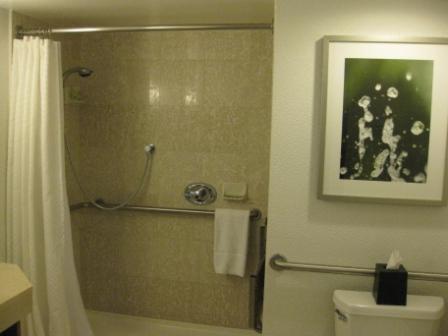Hilton settled with the U.S. Department of Justice on charges of violating the Americans with Disabilities Act for accessible hotels. The settlement includes a $50,000 civil penalty and Hilton is ordered to bring hotels built after January 26, 1993 in compliance with ADA requirements for accessible facilities and rooms.
The lawsuit stemmed from Hilton failing to provide accessible rooms with roll-in showers and tubs to people with disabilities and not having a sufficient supply of rooms at its hotels. The difficulty of reserving an accessible room was also mentioned.
Hilton is required to ensure franchise properties are in compliance with the 1990 Americans with Disabilities Act to remain branded with Hilton.
Here is the full U.S. Department of Justice statement from November 9, 2010.
Justice Department Reaches Agreement with Hilton Worldwide Inc. Over ADA Violations at Hilton Hotels and Major Hotel Chains Owned by Hilton
WASHINGTON – The Justice Department and Hilton Worldwide Inc. today announced a comprehensive, precedent-setting agreement under the Americans with Disabilities Act (ADA) that will make state-of-the-art accessibility changes to approximately 900 hotels nationwide. The agreement is in the form of a proposed consent decree filed today in federal court to resolve a simultaneously filed lawsuit under the ADA.
The department’s complaint alleges that Hilton’s hotels designed and constructed after Jan. 26, 1993, fail to comply with the ADA and Department of Justice regulations. Hilton operates a system of hotels throughout the United States under the trade and service names of “Hilton,” “Conrad Hotels & Resorts,” “Doubletree,” “Embassy Suites,” “Hampton Inn,” “Hilton Garden Inn,” “Hilton Grand Vacations,” “Homewood Suites,” “the Waldorf Astoria” and “Home2Suites.” Hilton Worldwide Inc. (HWI), owns, operates, or has entered into and maintains franchise license agreements for each hotel in the HWI system.
“The ADA protects the right of people with disabilities to stay in accessible hotel rooms, and to reserve those hotel rooms through the same convenient systems as everyone else,” said Thomas E. Perez, Assistant Attorney General of the Civil Rights Division. “Persons with disabilities who travel for pleasure or business must be able to count on getting the accessible room they reserved, and the hotel must provide the choice of amenities that everyone comes to expect from a major national hotel chain like Hilton.”
The agreement is the result of a lengthy investigation and negotiation. Hilton officials cooperated with the department throughout the process. Allegations in the department’s complaint include failure to provide the required number of accessible rooms, failure to disperse accessible rooms among the various categories of available accommodations, failure to provide individuals with disabilities the ability to reserve accessible rooms through Hilton’s central reservations system on-line or by telephone, and failure to provide individuals with disabilities with the accessible sleeping accommodations that they reserved.
Today’s settlement represents the first time the Department of Justice has required a franchisor to require all franchised or managed hotels that enter into a new franchise or management agreement, experience a change in ownership, or renew or extend a franchise agreement, to conduct a survey of its facilities and to certify that the hotel complies with the ADA. It is also the first time that an agreement under the ADA has specifically detailed how a hotel reservations system should be made accessible. The agreement also represents the first time that a hotel chain has been required to make its online reservations system accessible and to provide on its website current data about accessible features in guest rooms throughout the chain.
Under the agreement:
- All owned and joint venture hotels built after Jan. 26, 1993 will be surveyed and brought into compliance with Department of Justice ADA title III regulations, including dispersing accessible rooms among the various classes of available accommodations, providing accessible rooms with roll-in showers and tub seats, and providing accessible rooms for guests with hearing impairments;
- For franchised and managed hotels built after Jan. 26, 1993, where Hilton enters into a new franchise or management agreement, renews or extends an agreement for more than six months, or agrees to a change of ownership, Hilton will require the owners to survey their hotels for compliance with specified provisions of the ADA, and where necessary, bring their hotels into compliance;
- Hotels constructed in the future will be required to comply with the ADA;
- Specific ADA training will be provided for staff;
- Hilton’s reservations system will be improved so individuals with disabilities can reserve accessible rooms with specific available options and amenities, and have the same opportunity to guarantee a reservation for an accessible room as that offered for any other reservation;
- Hilton will improve the accessibility of its websites;
- Hilton will appoint a national ADA compliance officer responsible for Hilton’s compliance with the ADA and the consent decree;
- Hilton will appoint ADA on-site contact persons at each hotel responsible for resolving ADA-related complaints at the local level; and
- Hilton will pay a civil penalty of $50,000 to the United States.
People interested in finding out more about the ADA or this consent decree can call the toll-free ADA Information Line at 800-514-0301 or 800-514-0383 (TDD), or access the ADA website at www.ada.gov.
http://www.justice.gov/opa/pr/2010/November/10-crt-1268.html




5 Comments
Comments are closed.